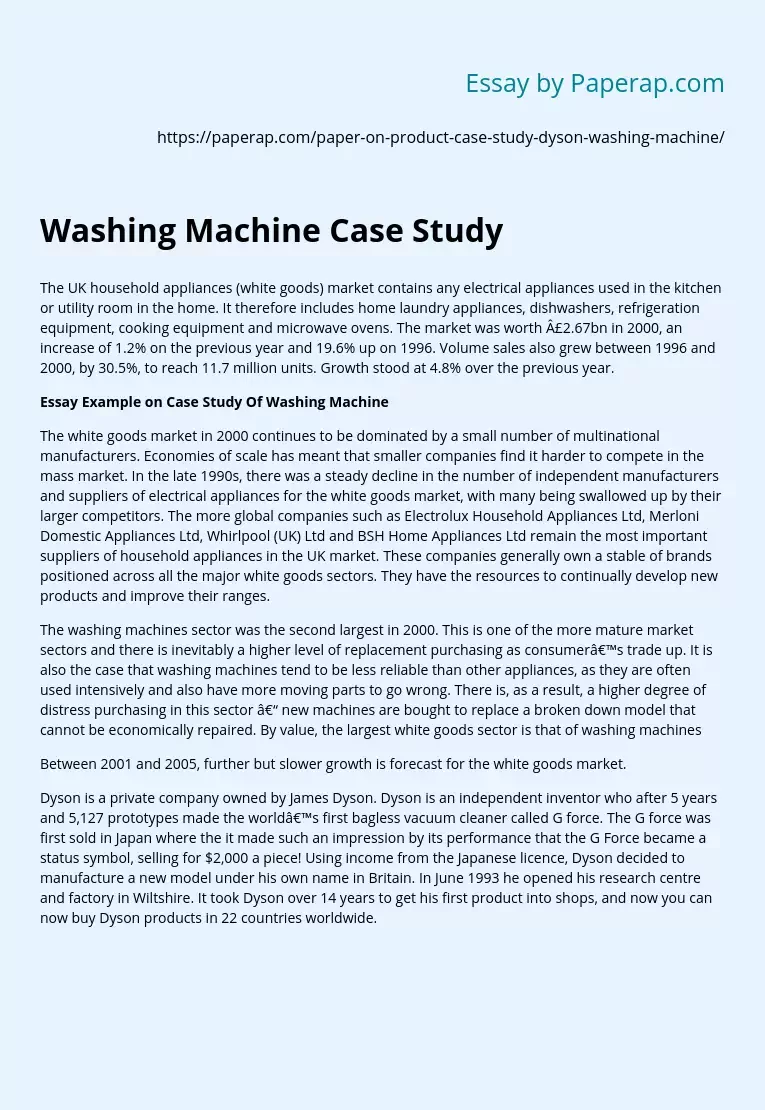Washing Machine Case Study
The UK household appliances (white goods) market contains any electrical appliances used in the kitchen or utility room in the home. It therefore includes home laundry appliances, dishwashers, refrigeration equipment, cooking equipment and microwave ovens. The market was worth £2.67bn in 2000, an increase of 1.2% on the previous year and 19.6% up on 1996. Volume sales also grew between 1996 and 2000, by 30.5%, to reach 11.7 million units. Growth stood at 4.8% over the previous year.
Essay Example on Case Study Of Washing Machine
The white goods market in 2000 continues to be dominated by a small number of multinational manufacturers.
Economies of scale has meant that smaller companies find it harder to compete in the mass market. In the late 1990s, there was a steady decline in the number of independent manufacturers and suppliers of electrical appliances for the white goods market, with many being swallowed up by their larger competitors. The more global companies such as Electrolux Household Appliances Ltd, Merloni Domestic Appliances Ltd, Whirlpool (UK) Ltd and BSH Home Appliances Ltd remain the most important suppliers of household appliances in the UK market.
These companies generally own a stable of brands positioned across all the major white goods sectors. They have the resources to continually develop new products and improve their ranges.
The washing machines sector was the second largest in 2000. This is one of the more mature market sectors and there is inevitably a higher level of replacement purchasing as consumer’s trade up. It is also the case that washing machines tend to be less reliable than other appliances, as they are often used intensively and also have more moving parts to go wrong.
There is, as a result, a higher degree of distress purchasing in this sector – new machines are bought to replace a broken down model that cannot be economically repaired. By value, the largest white goods sector is that of washing machines
Between 2001 and 2005, further but slower growth is forecast for the white goods market.
Dyson is a private company owned by James Dyson. Dyson is an independent inventor who after 5 years and 5,127 prototypes made the world’s first bagless vacuum cleaner called G force. The G force was first sold in Japan where the it made such an impression by its performance that the G Force became a status symbol, selling for $2,000 a piece! Using income from the Japanese licence, Dyson decided to manufacture a new model under his own name in Britain. In June 1993 he opened his research centre and factory in Wiltshire. It took Dyson over 14 years to get his first product into shops, and now you can now buy Dyson products in 22 countries worldwide.
Washing Machine Case Study. (2019, Nov 27). Retrieved from https://paperap.com/paper-on-product-case-study-dyson-washing-machine/

